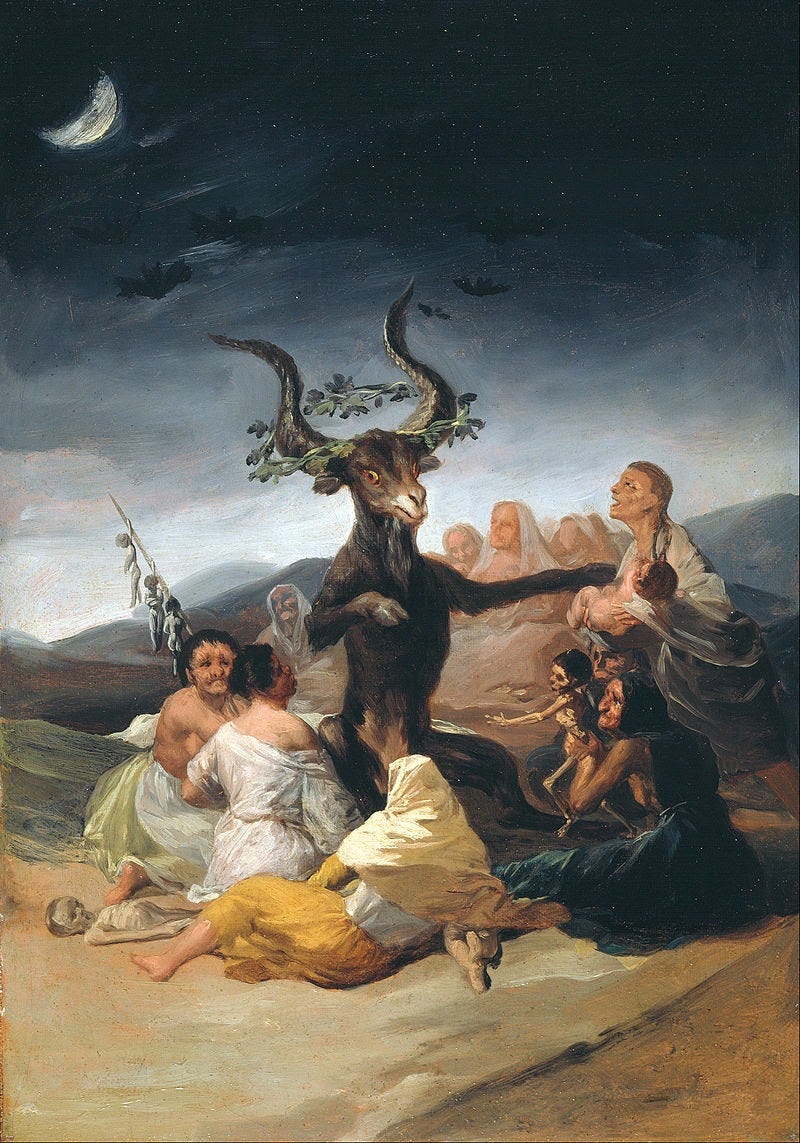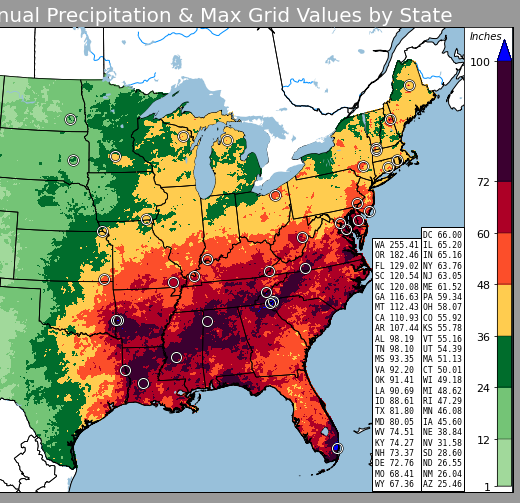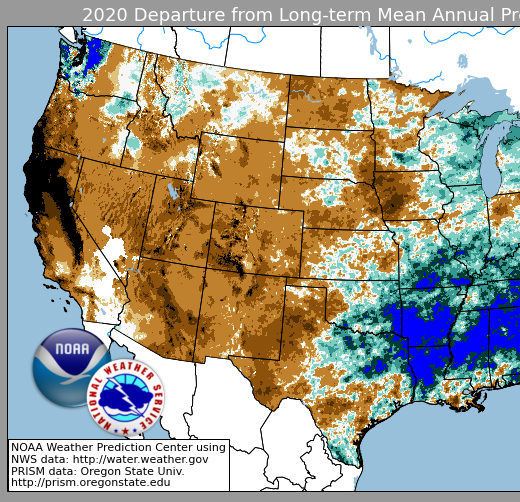5
"hail satan"
Happy belated… solstice, Christmas, Hannukah, Three Kings’ Day, Jupiter/Saturn conjunction, full moon, snow(?)… et al.
As the insanity of this country continues, the day-to-day political drama obscures a more meaningful complexity beneath and within the spectacle. There is perhaps no arena in which this is more true than climate—2020 seems to be, as predicted, at least tied for hottest year in human history, and there is no sign of that trend doing anything but accelerating in 2021 even as our sense of the present is warped by the political hysterics in Washington, DC (and a handful of state capitals), amid the ongoing devastation of the country by the coronavirus.
There’s plenty of excellent information and analysis on all of the above out there, and we include some suggestions below, but here we primarily take the opportunity of the new year and holidays (slightly belated) to direct your attention to some topics that are stranger and less explicitly material, although no less real.
Several weeks ago we were able to speak to Daniel Pinchbeck for an episode of end talk. Pinchbeck has been on (my) radar since 2015, when I somewhat serendipitously discovered his 2006 book 2012: The Return of Quetzalcoatl. My feelings about the book are complex, but briefly, 2012 is fascinating and provides a particular, journalistic approach to strange realms of consciousness, the occult, and frameworks for understanding what constitutes reality. In the book, Pinchbeck explores topics ranging from 20th-century relativistic physics, to the philosophical work of Jean Gebser, to crop circles, to psychedelics (including iboga, ayauhasca, and DMT)—and perhaps above all, to Mayan and other indigenous and traditional conceptions of time and reality—to effectively construct a theory of consciousness as fundamental substrate of the Universe. It is a compelling thesis, and as he erects the scaffolding you find that he is hardly alone in this view—the book is perhaps above all a well-curated synthesis of widely diverse ideas. Indeed, Pinchbeck opened the door, for me, to quite a few interesting thinkers—including Walter Benjamin, Jean Gebser, and Mitch Horowitz (excellent lecture of his below). It was a real pleasure to speak to Daniel and discuss some of these themes directly—as well as newer ones he’s been focusing on recently—and I encourage you all to listen to our episode (below) and check out his work. I’d suggest beginning with his first book (Breaking Open the Head) or following him on Substack.
—W
PS I suppose I spoke a little too soon when I said this issue will focus mostly on the immaterial, as the climate section below turned out longer than I expected and is nothing if not MATERIAL. Alarming!
Please subscribe, share, and if compelled, donate to help cover our Soundcloud hosting costs!
[Climate Roundup]
Daily CO2 (recorded 1/8/2021 in Mauna Loa, Hawaii): 414.98 ppm
Global Warming Already Baked In Will Blow Past Climate Goals, a New Study Says
If the world gets to net zero carbon emissions soon, 2 degrees of global warming could be delayed enough so that it won’t happen for centuries, giving society time to adapt or even come up with technological fixes, [climate scientist Andrew Dessler] said.
“If we don’t, we’re going to blow through (climate goals) in a few decades,” Dessler said. “It’s really the rate of warming that makes climate change so terrible. If we got a few degrees over 100,000 years, that would not be that big a deal. We can deal with that. But a few degrees over 100 years is really bad.”
Dozens of frogs, fish, orchids and other species — many unseen for decades — may no longer exist due to humanity’s destructive effects on the planet.
19th century drawings of orchid species recently declared extinct in Bangladesh.
A combination of predatory invasive species, [over-harvesting] and [destructive] fishing methods (such as dynamite fishing) wiped these lost species out. The IUCN this year listed 15 of the species as “extinct” following extensive searches and surveys; the remaining two as “critically endangered (possibly extinct).” The predators, by the way, are still doing just fine.
What has made Daniel Pinchbeck’s work so compelling to me is its functioning as a kind of explanation for phenomena that inherently defy explanation. This isn’t as simple as it might sound. Take a bizarre phenomenon like alien abduction accounts. These recollections seem to begin (like most mass UFO phenomena) in the period after the Second World War, becoming far more culturally widespread in the late 20th century. People who follow these stories tend to fall into one of two camps: the accounts are real, or (far more in this category) they’re not real. Pinchbeck offers a third option: these experiences exist in a realm of consciousness that exists somewhere between our material reality and a more dream-like, mythic state. They’re not real, but they’re not not real. Indeed, Pinchbeck suggests convincingly that our present, insistently material reality simply offers one particular if distinct frame of consciousness, or of experiencing reality, and that forms of consciousness existing in past epochs allowed for different conceptions of reality.
Through Pinchbeck’s work I became acquainted with Mitch Horowitz, a writer on the occult and other esoteric topics. Horowitz was an editor on Pinchbeck’s book 2012 and is considered a leading expert (maybe the leading expert) on the New Thought movement. (New Thought turns out to be a surprisingly pervasive thread throughout 20th/21st-century America—arguably, Donald Trump is the most well-known practitioner—and we briefly discuss it in our conversation with Daniel.) I’ve yet to delve deeply into Horowitz’s work but his lecture below, from late 2019, from which I borrowed the lead artwork for this issue, is fascinating. (For a more concise explanation of Horowitz’s view of the Satanic, see this essay.)
In a not wholly dissimilar vein, great listening on the mysteries of UFOs in the Southwest in particular from the Trillbilly Worker’s Party podcast:
This past weekend marks some anniversaries for Davie Bowie; January 8th, his birthday, he would’ve been 74 years old and January 10th, the day he died in 2016, marks a five year anniversary. This year January 8th and 10th fell on a Friday and Sunday—just as in 2016, on a weekend I remember quite vividly. The excitement I felt about the release of Blackstar butted up against the surreal experience of reading about his death; I can remember it all so clearly, it’s hard to believe five years has passed since then.
In light of that, here’s a cover I recorded of “Ashes to Ashes” on piano.
—G
[The Twilight Zone]
“Global Flight 33. Position 52 North, 30 West. Time 14:03. Flight Level 35,000. Estimating 51 North, 40 West at 14:45. Estimating Idlewild 18:30. Fuel remaining 79560. Temperature minus 57….”
What makes The Twilight Zone just as compelling now as it was when it originally aired on television—and increasingly so? Perhaps it is that it epitomizes the “uncanny”—as described, for example, by Freud: “that class of the terrifying which leads back to something long known to us, once very familiar” (“The Uncanny,” 1919). The events the series imagines and presents could happen; they have a particular closeness to reality, which makes them so unnerving. It is as if they are part of an alternate reality—yet it is not an alternate reality but rather the same reality—there is only one. These multiple dimensions of reality, planes of existence and consciousness, always simultaneously exist, in balance with or possibly in opposition to each other.
Perhaps The Twilight Zone epitomizes a (potential) world where—things are not what they seem; there isn’t an intrinsic morality in the universe that protects the weak and rewards the good—sometimes both are the subjects of tragedy; there isn’t a measured, linear nature to time and space, which we can quantify and control. Perhaps the series suggests, above all, that there are things—out there, here—that we cannot explain, but are nevertheless real.
The series, which ran from 1959 to 1964 on CBS, raises many questions just as relevant today as ever. Are people evolving past a point they should reach? Is technology, science getting away from us, getting on top of us—loosing itself of our control? What is the fate of mankind in an increasingly mechanized world, and in a godless world? What happens to god in a world where there’s no longer a place for god, and yet god exists? We think of our consciousness as an element of reality, that at least one—or both—is fixed; they are finite parts of our experience that we can understand and control. But what if the truth is more complicated, that consciousness, reality, and something else are at play—occasionally beyond our ability to perceive and completely beyond our ability to control?
—L
Like, comment, share, follow social media — thank you for reading!













